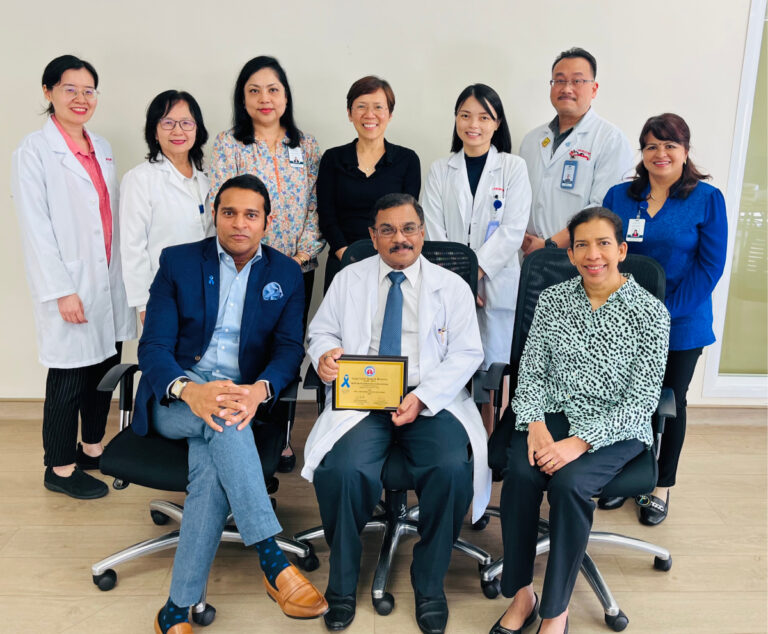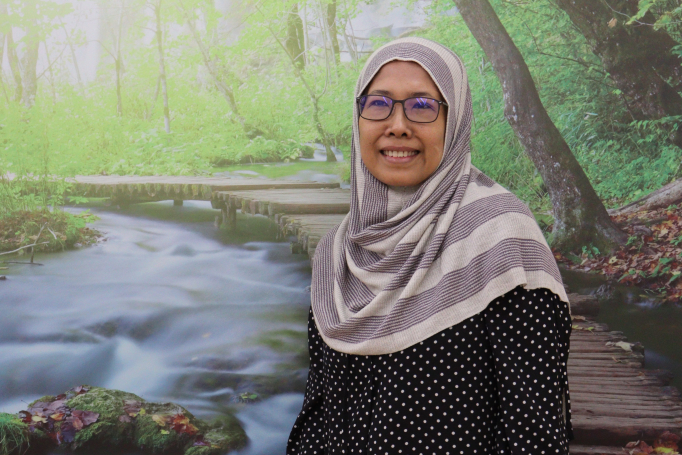Leading The Way: How Genomic Profiling is Transforming Cancer Care in Malaysia
Subang Jaya Medical Centre is the First Hospital in Malaysia to Publish Next-Generation Sequencing Data in Lung Cancer, Setting New Standards in Personalised Treatment

When Puan Roziah was told she had Stage 4 lung cancer in 2014, her world changed overnight. But what followed was not just a fight for survival, it marked a shift in how cancer is treated in Malaysia. Under the care of Subang Jaya Medical Centre (SJMC), her treatment was guided by precision medicine, a personalised approach driven by advanced genetic testing.
“As we mark 40 years of care, SJMC is proud to lead the way in genomic profiling, having introduced advanced molecular genetics services in 2018 via our MS ISO 15189 accredited laboratory,” says Prof Dr Pathmanathan Rajadurai, Consultant Pathologist at SJMC. “It’s helping us treat cancer more precisely, giving patients like Puan Roziah real hope for a better outcome.”
Thanks to innovations like Next-Generation Sequencing (NGS), patients are now getting treatments tailored to their cancer’s unique genetic profile, changing not just how long they live, but how well they live.
SJMC is the first hospital in Malaysia to publish NGS data, detailing the mutational profiling of Malaysian lung cancer patients of local lung cancer patients. These findings are not only reshaping treatment approaches in Malaysia but also aligning local oncology practices with the global frontier of cancer care. Beyond lung cancer, SJMC also applies NGS and related genomic tests across other solid tumours, including breast, colorectal, and blood cancers, as part of its commitment to precision oncology.

Prof Dr Pathmanathan Rajadurai, Consultant Pathologist at SJMC.
Why Genomic Profiling Matters: Understanding Precision Medicine
Traditional cancer treatment often takes a one-size-fits-all approach, with chemotherapy or radiotherapy delivered according to general cancer types and stages. However, not every tumour behaves the same way. Enter precision medicine.
“Precision medicine is a game changer. It tailors cancer treatment to each individual’s genetic makeup, rather than applying the same treatment across the board,” explains Prof Dr Pathmanathan. “By understanding the mutations that drive a patient’s cancer, we can choose therapies that specifically target those mutations, resulting in better outcomes and fewer side effects.”
At the heart of this approach is a technology called NGS, a powerful genomic tool that can rapidly analyse tumour DNA. NGS enables oncologists to pinpoint genetic alterations that fuel cancer growth, helping them select treatments with surgical precision.
The Impact of Data: Turning Research into Results
Prof Dr Pathmanathan and his team’s study, titled "Mutation Profiling of Lung Adenocarcinoma Using Targeted Next-Generation Sequencing: A Malaysian Perspective", revealed that Malaysian patients with lung cancer had a significantly higher prevalence of Epidermal Growth Factor Receptor (EGFR) mutations. These mutations respond well to targeted therapies known as tyrosine kinase inhibitors (TKIs) - drugs that target specific proteins involved in cancer cell growth.
They also found a rise in KRAS G12C mutations, often linked to smoking, which are now treatable with new precision drugs. Additionally, the team observed more cases of ALK and ROS1 gene rearrangements, genetic changes that can also be matched with specific targeted therapies designed to slow or stop tumour growth.
These findings are consistent with international research, including a study published in the Journal of Thoracic Oncology, which similarly reported higher rates of EGFR and ALK mutations among Malaysian lung cancer patients compared to Western populations. This highlights the importance of using local genomic data to guide treatment decisions.
“This published data is pivotal,” says Prof Dr Pathmanathan. “We now have local insights to help clinicians identify the most effective therapies for Malaysian patients. It also supports early detection efforts and helps shape national health strategies. We are bridging global innovation with local relevance.”

“Find something each day to live for. And no matter what, keep going," says Puan Roziah.
A Real-Life Journey: Puan Roziah’s Story of Strength and Science
For Puan Roziah, the diagnosis came as a shock. A persistent cough led to tests, and then to a life-altering reality, Stage 4 lung cancer. “It was devastating,” she recalls. “But I’m not someone who gives up easily.”
Her oncologist at SJMC recommended a targeted therapy plan, one based on her tumour’s genetic profile, uncovered through NGS.
“The treatment wasn’t easy,” Puan Roziah says. “I had side effects - hair loss, dry skin, nausea. But I kept going. I continued working in customer service, and that gave me a sense of purpose. My husband was incredibly supportive. He stood by me through everything, and that gave me strength.”
For years, she responded well to the treatment and was closely monitored. But in 2021, Puan Roziah began experiencing seizures. A scan revealed that her cancer had spread to her brain. One tumour measured 4cm, another was just 2mm. The larger tumour was removed through surgery, followed by focused physiotherapy. But the smaller one started to grow.
That was when her medical team proposed radiosurgery, a minimally invasive treatment that uses high-dose radiation to target tumours with extreme precision. With the help of a high-precision radiotherapy system at SJMC, Puan Roziah underwent a 20-minute session using advanced real-time imaging and patient tracking technology.
“I found the treatment surprisingly smooth,” she says. “No cuts, no hospital stays. It was quick and I felt cared for.”
The tumour stopped growing and Puan Roziah gained not just more time, but a better quality of life.
A Path Forward for Malaysian Cancer Care
Puan Roziah experienced firsthand how cancer care in Malaysia is evolving. Today, genomic profiling is helping shape everything from early detection to personalised treatment planning and follow-up care.
“In the past, we relied on a series of tests that took time and may not have yielded a clear direction,” says Prof Dr Pathmanathan. “Today, one genomic test can offer actionable insights, helping doctors to act quickly and more effectively.”
Precision oncology, once a concept reserved for research hospitals, is now part of clinical reality at SJMC. But access remains a challenge.
“Cost, awareness, and infrastructure are real barriers,” Prof Dr Pathmanathan admits. “We are working to overcome this by collaborating with industry partners, expanding insurance coverage, and conducting awareness campaigns. Importantly, we are investing in training and infrastructure to bring this technology to more Malaysians.”
Beyond lung cancer, precision medicine is expanding to other fields, including cardiology, autoimmune diseases, rare genetic disorders, and even integrating AI to make sense of complex data. “Artificial intelligence will allow us to interpret genomic data faster and more accurately,” Prof Dr Pathmanathan shares. “It will also help personalise treatments in real time, not just in cancer but in many other areas of medicine.”
One of the most promising advancements already available at SJMC is liquid biopsy, a non-invasive blood test that can detect tumour DNA without the need for surgical tissue sampling. “It is especially valuable for patients who may not be able to undergo conventional biopsies,” adds Prof Dr Pathmanathan. “It allows for quicker, safer access to genomic insights.”
40 Years of Legacy, and a Vision for the Future
As SJMC celebrates four decades of trusted healthcare, it also stands at the helm of a new era in medicine.
“We are proud to be the first hospital in Malaysia to publish lung cancer genomic data. But more importantly, we are turning that data into decisions that extend lives, ease suffering, and offer hope,” says Dr Pathmanathan, who was conferred the World Cancer Day (WCD) award by the Lung Cancer Network Malaysia recently. The award recognises and honours outstanding individuals or organisations who have made a significant contribution towards improving lung cancer care and outcomes in Malaysia.
For patients like Puan Roziah, hope is real, not just a word, but part of her daily life. “I’m still here,” she says with a smile. “And I’m still moving forward. That’s what matters.”
Her advice to others? “Don’t let fear take over. Lean on the love around you. Find something each day to live for. And no matter what, keep going.”
Source:
